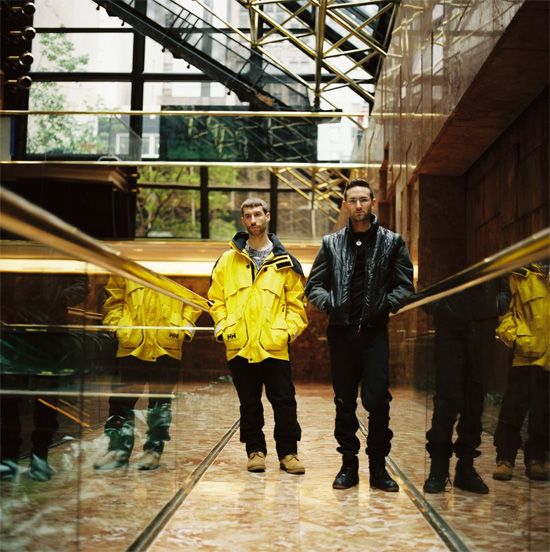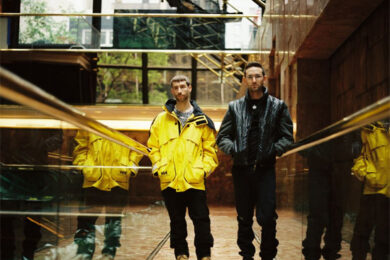"Every dream eventually comes to an end", Gatekeeper tell me towards the close of our email interview. Like their Hippos In Tanks labelmate James Ferraro, the duo maintain a kind of beguiling opacity in interviews, issuing theories on Roland 303s, ‘techno-addictions’ and World Heritage sites with a deeply cerebral but sly seriousness. The end of a dream is only exciting to Gatekeeper when it drifts off into nightmare. Their Giza EP (released in 2010) sounded like a very bad dream indeed, a fiendish and artfully constructed piece of horror score electronica that conjured visions of a serial killer stalking through a holographic graveyard.
The spirit that lured the Ghost Box sect into their hauntological adventures seemed to be suddenly possessing American bodies, too. Gatekeeper exhibited a similar attachment to an aesthetic which Quietus scribe Ryan A. Diduck has called ‘technostalgia’, an artistic attraction to obsolete and forgotten technologies. This impulse manifested itself in a fondness for analogue synths and the old graphics software they employed to produce films of malevolent computer-world terrain later gathered on VHS cassettes. But it also seems like the conceptual drive behind that first EP. Aaron David and Matthew Arkell brought a much more visceral and blood-curdling atmosphere into this spooky aesthetic. If one of Ghost Box’s first aural touchstones was the sound of those cheery pagans drunk on evil, singing as the sun falls into the sea and Edward Woodward howls in the belly of the Wicker Man, then Gatekeeper were interested in its American counterpart: a potent combination of the psychotic, undead and electronic. They were attempting to reconstruct the atmosphere that hangs over eighties horror flicks, mimicking the sleek and insistent pulse that drives those psychically hollowed monsters through California shadowlands of neon and chrome.
The dream under discussion is one that now seems unbelievably distant and ridiculous – we’re considering the sense of utopian possibility that surrounded computing in the early nineties. This is one of the many strange inputs feeding into their latest work. In an interview for sadly-departed hypnogogia/eerie electronica repository Altered Zones just before the release of Giza, the duo described their fantasy project: scoring "some multi-dimensional sci-fi film that has scenes in the desert, in the rain-forest [and] post-apocalyptic cityscapes". With their debut LP, Exo, this dream has become a monstrous reality (proper visual accompaniment will come soon in the shape of a ‘virtual environment’ constructed with their friend, the digital artist Tabor Rebak). Mammoth and menacing, it marks the conclusion of one nightmare and the commencement of another. Heavily influenced by the hallucinatory clarity of recent Hollywood special effects banquets, it’s a vivid and frightening piece of sonic fiction. By its end, with the aural apocalypse of ‘Encarta’ (imagine Carl Orff’s ‘O Fortuna’ merged with Detroit techno in a burning club) you’re immersed in a startling, synthetic ocean of sound.
Cinema is a constant reference point, and Exo evokes what they’d call ‘historically futuristic’ imagery: the few decent hyperreal sequences in Hackers where luminous data sprawls across the mainframe, and the evil techno-noir of Darren Aronofsky’s Pi. This is the unreal world of Hollywood deformed by Cronenberg’s Videodrome.
In the same interview David claimed such uncanny and retro-fetishistic material was the eventual outcome of an "intellectual crisis" he experienced at art school. Originating from his attempts "to deal with the idea of originality and not feeling like it was possible", this period of doubt caused "a total fracture in my work creatively" but coincided with him befriending Arkell and led to the material they make together as Gatekeeper. Exo is also the point where the reconstructive work concludes. They’re still keen on old technologies but the scale of their work has radically altered as they explore a vast (and unmapped) dystopia.
You’re always keen to foreground non-musical influences on your work. You’ve cited ‘ancient astronauts’, The Jupiter Menace and Chronos as influences in the past. What were you drawing upon whilst making Exo?
Gatekeeper: Last year we had the opportunity to visit several World Heritage sites. We were inspired by these environments, their monumental scale and beauty, the physical realisations of pop-mythology in real-time. The sites are totally unknowable but they possess an inner familiarity, and provided us [with] an opportunity to connect with some of our major cinematic inspirations.
What sounds were you drawing upon, reconstructing?
G: On this record, we were really drawn to high-definition movie trailer sound design and effects. Sampling [this material] helped us to construct vivid, exaggerated scenes and settings, full of cinematic ambiguity. We were also drawn to the sound of the Roland TB-303 for its historically futuristic techno quality and hypnotic sonic ferocity. Obviously we both love acid.
The album’s first track (‘Dromos’) is very gentle, a pastoral-outer-space sound, but things grow gradually darker and by the album’s end we’re subjected to a pretty terrifying sound (‘Encarta’, which sounds like an aural rendering of the apocalypse.)
G: Definitely. Exo follows a loosely plotted creation-destruction narrative arc. The virtual environment we constructed with Tabor Rebak explores this further.
The Giza EP was full of similar menacing atmospheres but drew upon a different set of technologies to produce them. What’s changed in the way you work?
G: On Giza, we were creating more specific referential atmospheres so we often limited ourselves to using the same tools used in the eras we were channelling (analogue synths, for example). Exo was our attempt to create something that, ideally, was specifically referential only to itself… a record that looks forward in addition to looking backwards. For that we relied more heavily on sample editing and sound design to contextualise it within a more contemporary experience, like going to see a movie in IMAX.
The gathering sense of unease, disorientation and terror on this explicitly technological, computerised album makes me wonder about your relationship with technology. Are machines malevolent?
G: Technology has surpassed nature as the primary force that frames our reality. But ‘with the invention of ship comes the invention of the shipwreck’ and there is obviously a terrifying element underpinning our techno-addictions. Technology, unlike nature, has no internal mechanism to ensure its equilibrium.
Is there a nostalgia for the utopianism that surrounded computing in the early nineties when the internet and home computing were still young and exciting?
G: Not specifically. It’s hard not to admire the spirit of the age, but every dream eventually comes to an end.
Why the lingering fascination with irrelevant and forgotten technologies?
G: For us, these are far from forgotten or irrelevant programmes… these [sounds] soundtrack our everyday experiences and provide a framework for the way we choose to experience culture… [They] provide unlimited opportunities to re-imagine the present.
A vision of the future?
G: We’re looking at it. Soon you won’t be able to sign out.
Photo by Leia Jospe



